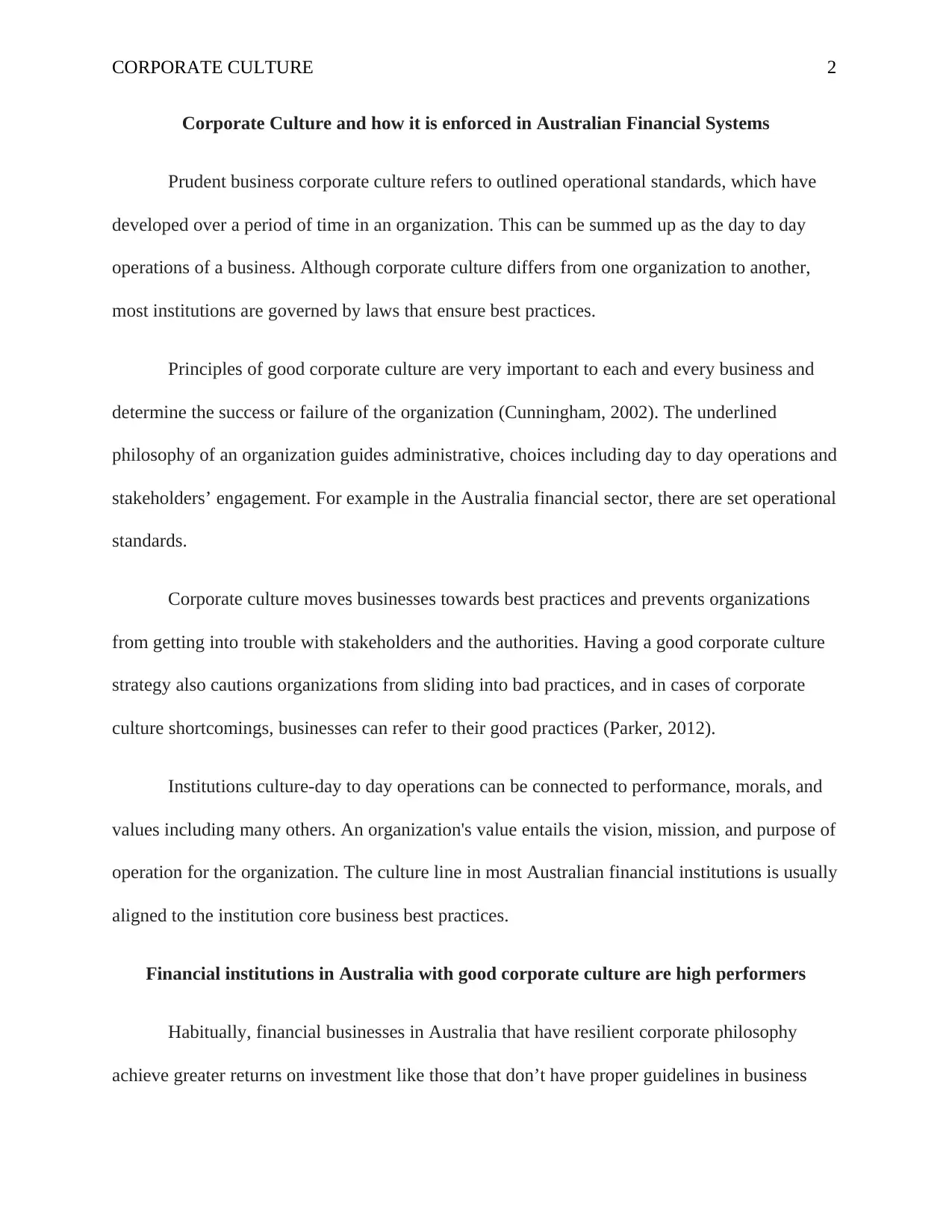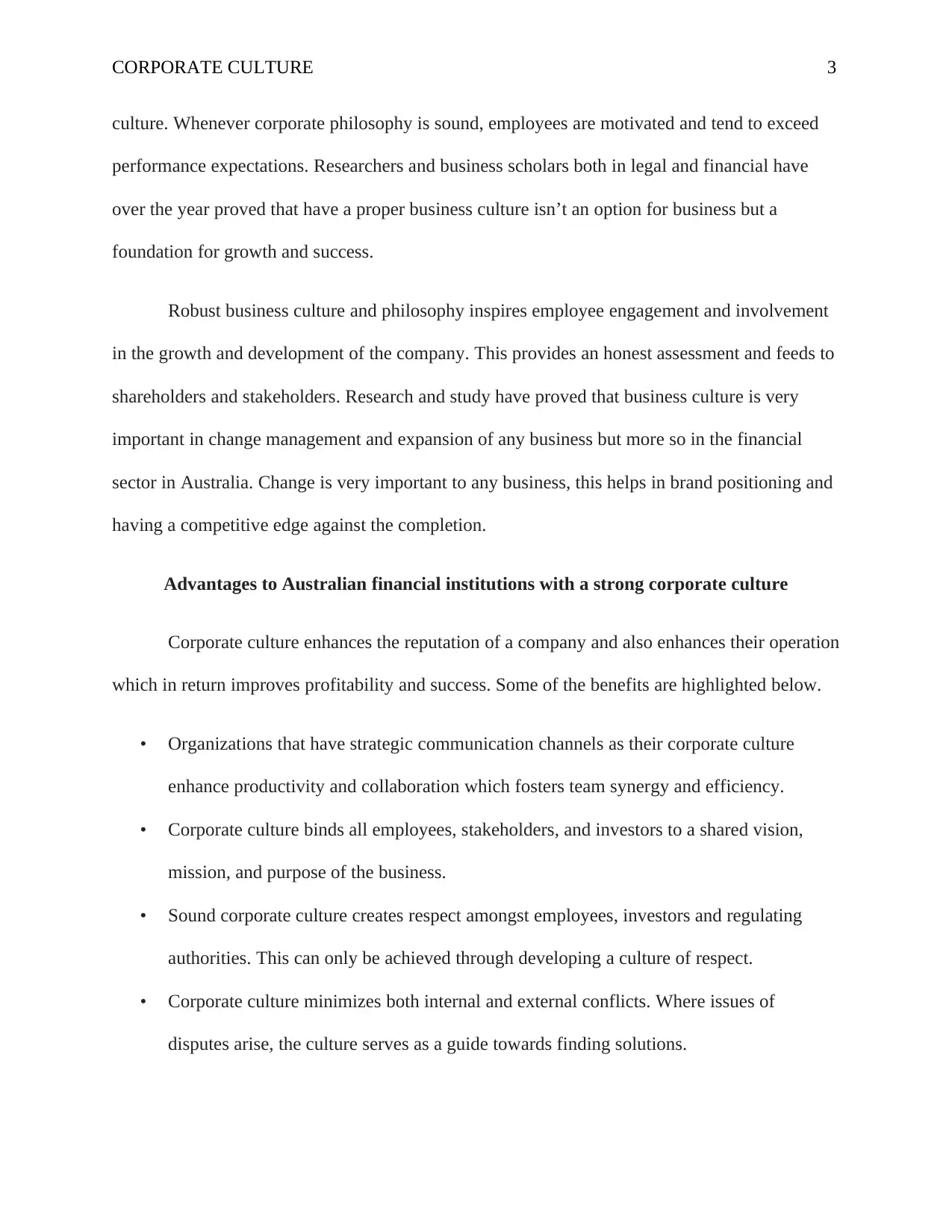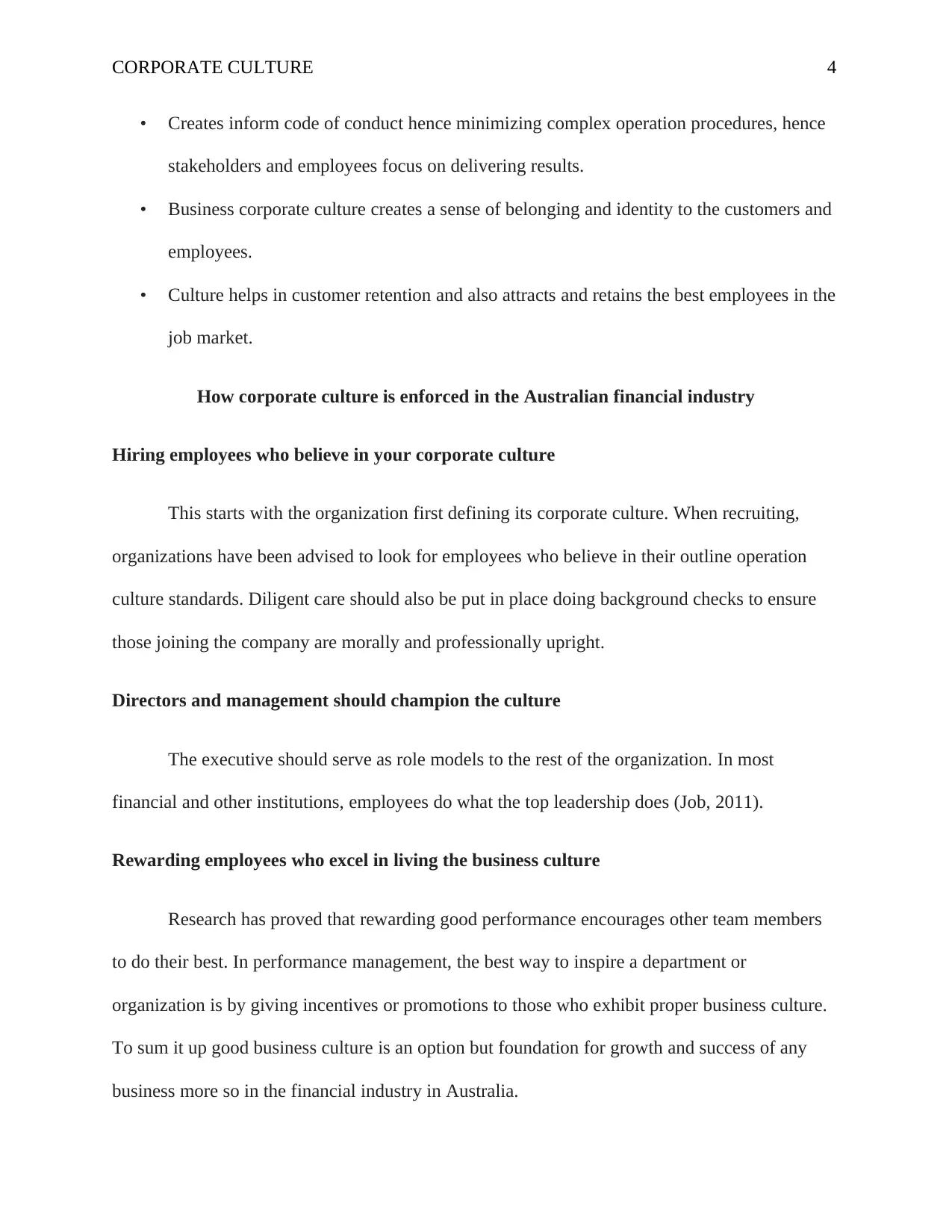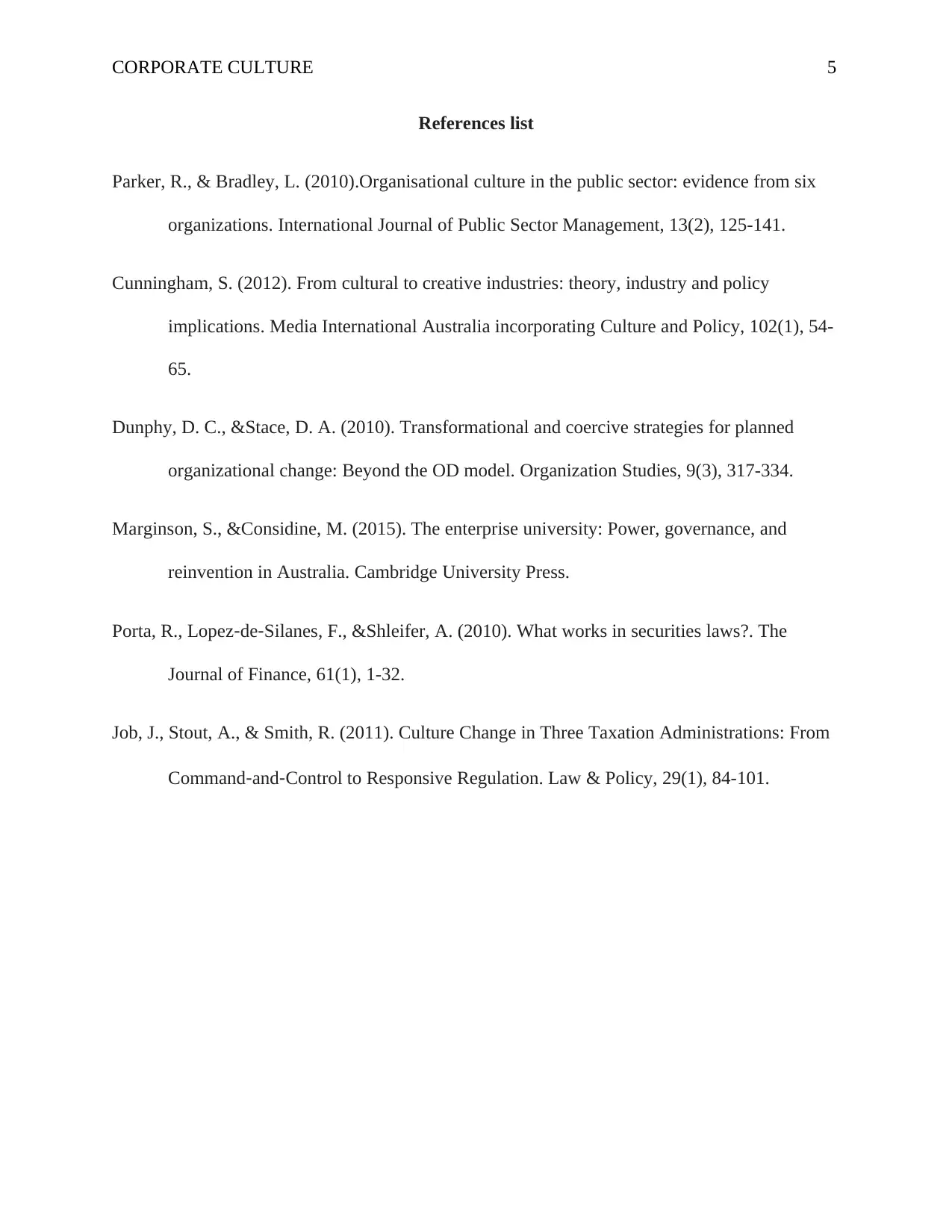Corporate Culture and its Enforcement in Australian Financial Systems
VerifiedAdded on 2021/06/17
|5
|1038
|84
Report
AI Summary
This report delves into the significance of corporate culture within the Australian financial system. It defines corporate culture as the established operational standards that guide a business's day-to-day activities and emphasizes its crucial role in an organization's success. The report highlights how a strong corporate culture in the Australian financial sector leads to improved performance, employee motivation, and stakeholder engagement. It discusses the advantages of a robust corporate culture, including enhanced reputation, improved productivity, and minimized conflicts. Furthermore, the report examines how corporate culture is enforced through strategic hiring, leadership example, and rewarding employees who embody the desired cultural values. The report concludes by underscoring that a good business culture is not an option but a foundation for growth and success, particularly within the Australian financial industry.

CORPORATE CULTURE 1
Corporate Culture and how it is enforced in Australian Financial Systems
Name:
Professor:
College:
Course:
City:
Corporate Culture and how it is enforced in Australian Financial Systems
Name:
Professor:
College:
Course:
City:
Paraphrase This Document
Need a fresh take? Get an instant paraphrase of this document with our AI Paraphraser

CORPORATE CULTURE 2
Corporate Culture and how it is enforced in Australian Financial Systems
Prudent business corporate culture refers to outlined operational standards, which have
developed over a period of time in an organization. This can be summed up as the day to day
operations of a business. Although corporate culture differs from one organization to another,
most institutions are governed by laws that ensure best practices.
Principles of good corporate culture are very important to each and every business and
determine the success or failure of the organization (Cunningham, 2002). The underlined
philosophy of an organization guides administrative, choices including day to day operations and
stakeholders’ engagement. For example in the Australia financial sector, there are set operational
standards.
Corporate culture moves businesses towards best practices and prevents organizations
from getting into trouble with stakeholders and the authorities. Having a good corporate culture
strategy also cautions organizations from sliding into bad practices, and in cases of corporate
culture shortcomings, businesses can refer to their good practices (Parker, 2012).
Institutions culture-day to day operations can be connected to performance, morals, and
values including many others. An organization's value entails the vision, mission, and purpose of
operation for the organization. The culture line in most Australian financial institutions is usually
aligned to the institution core business best practices.
Financial institutions in Australia with good corporate culture are high performers
Habitually, financial businesses in Australia that have resilient corporate philosophy
achieve greater returns on investment like those that don’t have proper guidelines in business
Corporate Culture and how it is enforced in Australian Financial Systems
Prudent business corporate culture refers to outlined operational standards, which have
developed over a period of time in an organization. This can be summed up as the day to day
operations of a business. Although corporate culture differs from one organization to another,
most institutions are governed by laws that ensure best practices.
Principles of good corporate culture are very important to each and every business and
determine the success or failure of the organization (Cunningham, 2002). The underlined
philosophy of an organization guides administrative, choices including day to day operations and
stakeholders’ engagement. For example in the Australia financial sector, there are set operational
standards.
Corporate culture moves businesses towards best practices and prevents organizations
from getting into trouble with stakeholders and the authorities. Having a good corporate culture
strategy also cautions organizations from sliding into bad practices, and in cases of corporate
culture shortcomings, businesses can refer to their good practices (Parker, 2012).
Institutions culture-day to day operations can be connected to performance, morals, and
values including many others. An organization's value entails the vision, mission, and purpose of
operation for the organization. The culture line in most Australian financial institutions is usually
aligned to the institution core business best practices.
Financial institutions in Australia with good corporate culture are high performers
Habitually, financial businesses in Australia that have resilient corporate philosophy
achieve greater returns on investment like those that don’t have proper guidelines in business

CORPORATE CULTURE 3
culture. Whenever corporate philosophy is sound, employees are motivated and tend to exceed
performance expectations. Researchers and business scholars both in legal and financial have
over the year proved that have a proper business culture isn’t an option for business but a
foundation for growth and success.
Robust business culture and philosophy inspires employee engagement and involvement
in the growth and development of the company. This provides an honest assessment and feeds to
shareholders and stakeholders. Research and study have proved that business culture is very
important in change management and expansion of any business but more so in the financial
sector in Australia. Change is very important to any business, this helps in brand positioning and
having a competitive edge against the completion.
Advantages to Australian financial institutions with a strong corporate culture
Corporate culture enhances the reputation of a company and also enhances their operation
which in return improves profitability and success. Some of the benefits are highlighted below.
• Organizations that have strategic communication channels as their corporate culture
enhance productivity and collaboration which fosters team synergy and efficiency.
• Corporate culture binds all employees, stakeholders, and investors to a shared vision,
mission, and purpose of the business.
• Sound corporate culture creates respect amongst employees, investors and regulating
authorities. This can only be achieved through developing a culture of respect.
• Corporate culture minimizes both internal and external conflicts. Where issues of
disputes arise, the culture serves as a guide towards finding solutions.
culture. Whenever corporate philosophy is sound, employees are motivated and tend to exceed
performance expectations. Researchers and business scholars both in legal and financial have
over the year proved that have a proper business culture isn’t an option for business but a
foundation for growth and success.
Robust business culture and philosophy inspires employee engagement and involvement
in the growth and development of the company. This provides an honest assessment and feeds to
shareholders and stakeholders. Research and study have proved that business culture is very
important in change management and expansion of any business but more so in the financial
sector in Australia. Change is very important to any business, this helps in brand positioning and
having a competitive edge against the completion.
Advantages to Australian financial institutions with a strong corporate culture
Corporate culture enhances the reputation of a company and also enhances their operation
which in return improves profitability and success. Some of the benefits are highlighted below.
• Organizations that have strategic communication channels as their corporate culture
enhance productivity and collaboration which fosters team synergy and efficiency.
• Corporate culture binds all employees, stakeholders, and investors to a shared vision,
mission, and purpose of the business.
• Sound corporate culture creates respect amongst employees, investors and regulating
authorities. This can only be achieved through developing a culture of respect.
• Corporate culture minimizes both internal and external conflicts. Where issues of
disputes arise, the culture serves as a guide towards finding solutions.
⊘ This is a preview!⊘
Do you want full access?
Subscribe today to unlock all pages.

Trusted by 1+ million students worldwide

CORPORATE CULTURE 4
• Creates inform code of conduct hence minimizing complex operation procedures, hence
stakeholders and employees focus on delivering results.
• Business corporate culture creates a sense of belonging and identity to the customers and
employees.
• Culture helps in customer retention and also attracts and retains the best employees in the
job market.
How corporate culture is enforced in the Australian financial industry
Hiring employees who believe in your corporate culture
This starts with the organization first defining its corporate culture. When recruiting,
organizations have been advised to look for employees who believe in their outline operation
culture standards. Diligent care should also be put in place doing background checks to ensure
those joining the company are morally and professionally upright.
Directors and management should champion the culture
The executive should serve as role models to the rest of the organization. In most
financial and other institutions, employees do what the top leadership does (Job, 2011).
Rewarding employees who excel in living the business culture
Research has proved that rewarding good performance encourages other team members
to do their best. In performance management, the best way to inspire a department or
organization is by giving incentives or promotions to those who exhibit proper business culture.
To sum it up good business culture is an option but foundation for growth and success of any
business more so in the financial industry in Australia.
• Creates inform code of conduct hence minimizing complex operation procedures, hence
stakeholders and employees focus on delivering results.
• Business corporate culture creates a sense of belonging and identity to the customers and
employees.
• Culture helps in customer retention and also attracts and retains the best employees in the
job market.
How corporate culture is enforced in the Australian financial industry
Hiring employees who believe in your corporate culture
This starts with the organization first defining its corporate culture. When recruiting,
organizations have been advised to look for employees who believe in their outline operation
culture standards. Diligent care should also be put in place doing background checks to ensure
those joining the company are morally and professionally upright.
Directors and management should champion the culture
The executive should serve as role models to the rest of the organization. In most
financial and other institutions, employees do what the top leadership does (Job, 2011).
Rewarding employees who excel in living the business culture
Research has proved that rewarding good performance encourages other team members
to do their best. In performance management, the best way to inspire a department or
organization is by giving incentives or promotions to those who exhibit proper business culture.
To sum it up good business culture is an option but foundation for growth and success of any
business more so in the financial industry in Australia.
Paraphrase This Document
Need a fresh take? Get an instant paraphrase of this document with our AI Paraphraser

CORPORATE CULTURE 5
References list
Parker, R., & Bradley, L. (2010).Organisational culture in the public sector: evidence from six
organizations. International Journal of Public Sector Management, 13(2), 125-141.
Cunningham, S. (2012). From cultural to creative industries: theory, industry and policy
implications. Media International Australia incorporating Culture and Policy, 102(1), 54-
65.
Dunphy, D. C., &Stace, D. A. (2010). Transformational and coercive strategies for planned
organizational change: Beyond the OD model. Organization Studies, 9(3), 317-334.
Marginson, S., &Considine, M. (2015). The enterprise university: Power, governance, and
reinvention in Australia. Cambridge University Press.
Porta, R., Lopez‐de‐Silanes, F., &Shleifer, A. (2010). What works in securities laws?. The
Journal of Finance, 61(1), 1-32.
Job, J., Stout, A., & Smith, R. (2011). Culture Change in Three Taxation Administrations: From
Command‐and‐Control to Responsive Regulation. Law & Policy, 29(1), 84-101.
References list
Parker, R., & Bradley, L. (2010).Organisational culture in the public sector: evidence from six
organizations. International Journal of Public Sector Management, 13(2), 125-141.
Cunningham, S. (2012). From cultural to creative industries: theory, industry and policy
implications. Media International Australia incorporating Culture and Policy, 102(1), 54-
65.
Dunphy, D. C., &Stace, D. A. (2010). Transformational and coercive strategies for planned
organizational change: Beyond the OD model. Organization Studies, 9(3), 317-334.
Marginson, S., &Considine, M. (2015). The enterprise university: Power, governance, and
reinvention in Australia. Cambridge University Press.
Porta, R., Lopez‐de‐Silanes, F., &Shleifer, A. (2010). What works in securities laws?. The
Journal of Finance, 61(1), 1-32.
Job, J., Stout, A., & Smith, R. (2011). Culture Change in Three Taxation Administrations: From
Command‐and‐Control to Responsive Regulation. Law & Policy, 29(1), 84-101.
1 out of 5
Related Documents
Your All-in-One AI-Powered Toolkit for Academic Success.
+13062052269
info@desklib.com
Available 24*7 on WhatsApp / Email
![[object Object]](/_next/static/media/star-bottom.7253800d.svg)
Unlock your academic potential
Copyright © 2020–2025 A2Z Services. All Rights Reserved. Developed and managed by ZUCOL.




